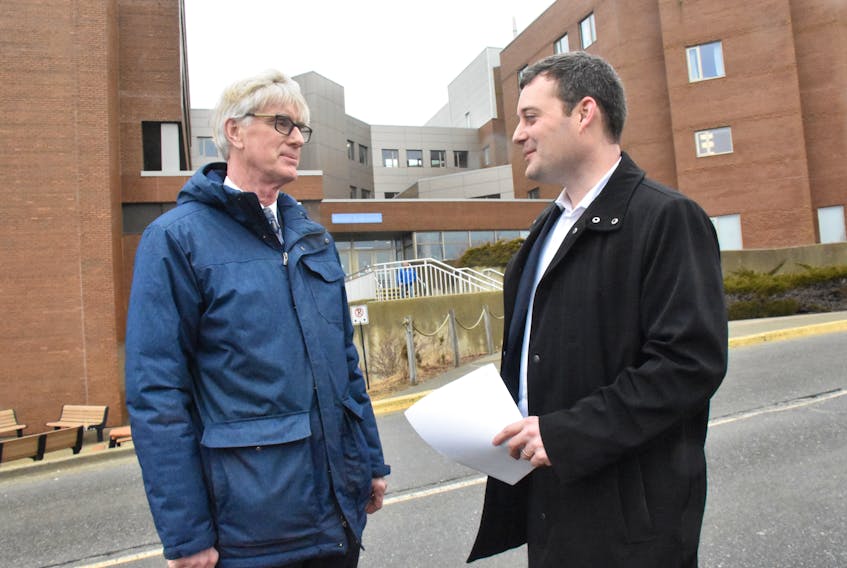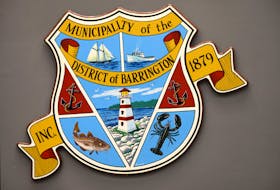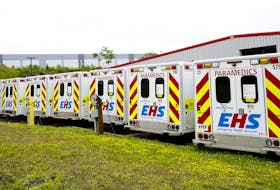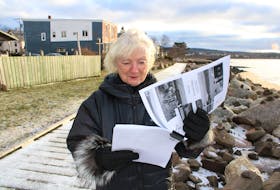YARMOUTH, N.S. — After lengthy and thoughtful exploration, consideration and deliberation it has been decided that a radiation therapy unit for cancer patients will not be housed at the Yarmouth Regional Hospital.
But other measures are going to be implemented to lessen the financial, mental and travel burden and stress that patients face when having to access cancer care outside of their community.
Last year an extensive review of cancer care in western Nova Scotia – and particularly the Yarmouth and surrounding area – was carried out. The review’s results were shared with health care staff, the hospital foundation, municipal leaders and other community stakeholders on Jan. 30 by Dr. Drew Bethune, the medical director of Nova Scotia Cancer Care, and provincial Health and Wellness Minister Randy Delorey.
While Dr. Bethune admitted there was initial disappointment that a radiation unit won’t be coming to Yarmouth, there was an understanding of why other options are being pursued.
It was pointed out that at the completion of a six-hour deliberation session in Yarmouth last June – which involved health care professionals, local cancer patients and other local stakeholders – three options were put forward: (1) the status quo, (2) a radiotherapy unit (3) or, a bundle of other enhancements.
By a vote of 12-2, the decision was to recommend the bundle of enhancements in the final report that went to the province’s health minister and health department.

So why no radiation unit?
Last summer more than 13,000 signatures were collected on a petition that was circulated in the public and submitted to the government asking for a radiation unit. On social media people shared stories about their hardships of traveling to Halifax for radiation treatments – sometimes for weeks at a time – and spoke about the financial, physical and emotional toll that took. It was not only hard on patients themselves, people said, but also family members who either had to make the trip with them to Halifax, or couldn't go and so they were separated by 300 kilometres.
The cost to construct and house a radiation unit at the Yarmouth Regional Hospital would have be $20 million, and then there are the added annual costs to keep it operational. But Bethune said the cost was not the overriding deciding factor.
“This was a Nova Scotia Health Authority committee, it was not a Department of Health and Wellness committee, so we weren’t trying to save money. We were trying to come up with the wisest decision,” he said.
“Although I’m not reluctant to ask the minister for money, I will not ask him for money unless I’ve gone through the process to be sure it’s absolutely necessary, that there’s no other way to provide that service and that it is the most cost-effective way and it brings huge benefits,” Bethune said.
In a 45-minute sit-down Bethune and Delorey had with the Tri-County Vanguard, Bethune said the review determined a unit in Yarmouth would not, and could not, accomplish everything that people hoped it would.

“The technology for the delivery of radiotechnology is changing to be smaller fractions, highly specialized, highly complicated with good results, with precision therapy,” Bethune said, saying the goal of this is to lessen the amount of treatments patients require.
“That is very difficult to accomplish in a small community with a single machine and a single team. To offer Yarmouth and area patients state-of-the-art radiotherapy, which I think is better than old-fashioned radiotherapy, it has to be done a big centre with sub-specialists who are specialized in the brain, and the breast and the lung, etc.”
So this is one answer to the question "Why no unit?", but what else?
“There are difficulties in staffing in smaller towns,” Bethune said, because you’re not only looking for those who operate these units, but the sub-specialists as well. You need a team.
And then there was this, he said, when they looked at the data.
“The demographics (from Yarmouth, Shelburne and Digby counties and parts of Queens and Annapolis Counties) showed that we would not have enough patients to fully occupy the machine,” said Bethune, who said this has two effects: it’s a resource that’s going unused and the skill set of the people delivering the radiotherapy doesn’t develop as well as it could.
He pointed out that in Cape Breton where there is radiotherapy available (and where the distance to Halifax is further than other parts of the province) the population they are drawing from is 140,000 compared to projections of 71,000 from western N.S. Still, even in Cape Breton the machines aren’t utilized as much as they could be, he said.
The review included:
• A study of recent cancer statistics to determine the potential number of patients in southwestern Nova Scotia who would benefit from radiation therapy at the Yarmouth Regional Hospital.
• Reaching out to other provinces for information and expertise.
• Researching cost estimates to design and build physical space (the bunker), and to purchase and maintain equipment should a decision be made to do so.
• Determining the size, makeup and budget for a clinical team needed to operate a radiation therapy service;
• Considering other cancer priorities and needs across the province and the trade-offs that would be necessary to add radiation therapy services in Yarmouth.
• Identifying challenges cancer patients face when having to access treatment outside of their communities and gaining a better understanding of the financial, emotional and physical stresses.
“They don’t have enough volume to do the more complicated types of radiotherapy and they don’t have enough staff to be sub-specialized.”
Speaking about enhancements in technology, Bethune said there’s evidence that smaller numbers of treatments can be as effective as larger numbers.
“Breast cancer treatments now, we’re able to do in some cases only 5 treatments instead of 15,” he said. “Prostate cancer, we have a technology now where we can do two treatments instead of 15 or 20.
“So the technology is highly targeted, highly accurate and requires huge amounts of expertise,” he said. This would have been a big challenge to achieve in Yarmouth.
What happens instead?
Part of the cancer care review involved surveying people on challenges they face when it comes to accessing cancer care – 943 people completed the survey. There were also two focus groups in Yarmouth, as well as frequent review team and subcommittee meetings.
The information gathered helped shape the enhancements that will be implemented. The work started the afternoon of Jan. 30 with the formation of a steering committee.
The enhancements include:
• Psychosocial support for patients: This will involve adding more supports such as social workers and psychologists to help work through and remove barriers patients face that would prevent them from receiving radiation treatment in Halifax. Treatment should not be a barrier to people because of finances, transportation or lack of family supports.
• Better coordination of appointments: The goal is for patients not to spend so much time going back and forth for appointments. As well, appointment times have to make sense and shouldn’t create financial burden by requiring a hotel stay, for instance.
• enhanced use of telemedicine;
• advances in radiotherapy technology so there are fewer appointments required resulting in less travel and stay time;
• better solutions to transportation and accommodations. On this last enhancement it’s known what the issues are. The next step is to figure out how to best address them.
Was the minister surprised?

Asked if there is anything about the review’s outcome that surprised him, Health and Wellness Minister Randy Delorey said when the process first started he expected the review to centre solely on the question of a radiation unit – yes or no?
But the review didn’t end with that question and Delorey said he wasn’t expecting other options to be included. He’s pleased that they were.
“The role that the proposed changes play, they are very detailed and thoughtful,” he said, saying they are changes that could help cancer patients – and other health-care patients – throughout N.S., in addition to western Nova Scotia. For instance everyone, he said, could benefit from better scheduling, as opposed to scheduling that isn’t effective and results in no-shows because appointments don’t work out for people.
That the review didn’t stop at the ‘yes or no’ question, Delorey said, “speaks volumes to the sincerity that they people spent on the review” and “their genuine interest in acknowledging the concerns of the community and finding a path forward.”
More reaction
Yarmouth resident Derek Lesser is one of the people behind the Facebook grassroots group Western Nova Scotia Cancer Support Network, where people have shared hardships and challenges caused by cancer care. He was amongst those in the room when the review’s results were outlined.
“I was expecting that we were either going to be told yes we’re getting a unit or no we’re not. When I heard we’re not, it was disappointment,” he said. “But after hearing the whole process I’m pleased with the outcome.”
While radiation services in Yarmouth would have helped residents, Lesser said it still wouldn’t have fixed all of the problems. With the enhancements that will be put in place, he’s hopeful more patients will receive better care than they are in the status quo.
“I don’t have cancer myself, so it’s hard to comment from a cancer patient’s point of view,” he acknowledged, although he has faced cancer in his family. “If we had an unlimited amount of money where you could do it all, it would be good to have a radiation centre here.
“But I’m not sure if could be staffed properly and as new technologies come out, because there’s a bigger cancer unit in Halifax they can implement those technologies there,” Lesser said, but not here.
“It was pretty close to a unanimous decision of stakeholders, that were not working for the department, that chose this option,” he added. “And Dr. Bethune appears to be a very honest man who wouldn’t have taken the job on if he thought the outcome wasn’t going to be the right one.”
Moving forward
After meeting with stakeholders, hospital staff, community leaders and this newspaper, Bethune and Delorey made a point of personally meeting with someone else – Yarmouth resident Sandy Dennis, a Yarmouth town councillor battling terminal cancer, who played a prominent role in seeing this cancer review happen. Dennis was also part of the stakeholders group that met last June as part of the review.
Whether residents and cancer patients agree with the review’s outcome, Bethune hopes they at least appreciate the process. This was not an overnight decision. It was not a decision taken lightly. Bethune said he promised people that this was not going to be a “Twitter answer” where people expect an issue can be solved in 140 characters or less.
“I told them we were going to study this and spend a lot of time on it,” he said, recalling that day last June when he left Yarmouth for the drive back home.
“I drove home saying, “Was that the right answer or not?” but I realized that’s not me making that decision, it’s everybody,” he said. “They don’t have the same medical knowledge I have, but they have every bit as much wisdom.”
As the implementation process of the measures moves forward there will be more community engagement.
“I feel a huge burden that I’ve got to deliver on this personally. So I’m going to drive this as fast as I can to get something happening. But, again, it’s got to be done right,” Bethune said.
“I’ve learned a lot about what people need, the personal toll it takes on people and I don’t like the thought that someone is not going to come to Halifax for radiotherapy when they should come because there are challenges to getting there,” he said. “So that’s my job. To know what people need and to try to fulfill that.”









